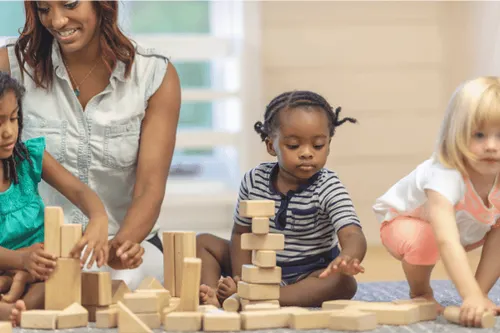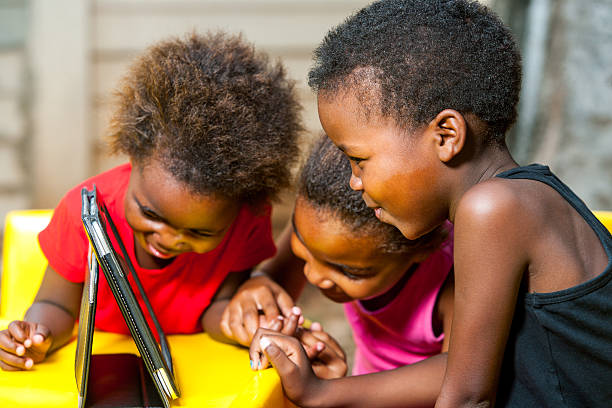

Engaging toddlers and preschoolers in the classroom through playful learning is one of the most effective ways to support their cognitive, emotional, and social development. In the realm of early childhood education, playful learning approaches foster a learning environment where young children actively participate in their education, making it more engaging, meaningful and impactful. As early childhood educators, we know that children’s experiences in these formative years lay the foundation for lifelong learning. This blog explores the importance of play and how to use playful learning to enhance young children’s development, while promoting a deeper understanding of the ways play shapes their educational journey.

Play has long been recognized as a key pillar of early childhood development. In early learning, play-based activities serve as a powerful tool for children to explore and understand the world around them. Whether through free play, guided activities, or interactive learning experiences, play empowers children to make choices, test ideas, and experience the joy of discovery in a nurturing environment.
Research consistently shows that when children engage in playful learning, they develop essential cognitive skills, such as problem-solving skills, critical thinking, and decision-making (Sylva, Bruner, & Genova, 1976; White & Carlson, 2016). These early play experiences also foster academic growth and emotional development (Hirsh-Pasek & Golinkoff, 2011).
Recent studies also emphasize that play not only supports emotional development but also nurtures self-regulation and motivation—critical components of supporting agency in early learning (Perry et al., 2002). Self-regulation, in particular, is vital for toddlers and preschoolers as they begin to understand the connections between their actions, feelings, and the resulting consequences. Through playful learning, children become active participants in their own growth, gaining a sense of control and ownership over their learning journey.
Play-based learning in the classroom is about more than just having fun—it’s about engaging children in activities that promote holistic skill development, such as cognitive, emotional and language development in a way that feels natural and enjoyable to them. This method can be categorized into three main types: free play, guided play, and interactive learning. Each of these play styles offers unique benefits in terms of how children learn and develop.
Each of these types of play supports different aspects of child development, from language acquisition to emotional regulation. By integrating a balance of free play, guided play, and interactive learning experiences into the classroom, educators can cater to the varied learning styles of young children while promoting their overall growth.

The importance of playful learning cannot be overstated when it comes to supporting early childhood development. Play is not merely a fun diversion—it is an essential component of children’s natural learning. As children engage with their peers, their environment, and educational materials, they are actively building the cognitive and emotional frameworks that will guide them throughout their lives.
Play-based learning encourages children to develop a variety of skills that are crucial for later academic skills. For instance, during dramatic play sessions, children develop language skills as they take on different roles and scenarios. They learn to negotiate with peers, resolve conflicts, and express their thoughts and feelings—valuable social skills that will serve them throughout their educational journey and beyond.
Research consistently shows that learning through play allows children to develop executive function skills—critical abilities such as working memory, cognitive flexibility, and self-control—that are closely linked to success in school (Blair & Diamond, 2008). In a preschool classroom, activities like role-playing, building with blocks, and engaging in collaborative group projects provide opportunities to practice these skills in a low-pressure setting.
Furthermore, play fosters problem-solving and critical thinking. Children who engage in play-based learning often face challenges that require them to think creatively to find solutions. For instance, when children are building a tower from blocks, they may need to experiment with different ways of stacking them to prevent the tower from falling. This hands-on exploration nurtures their ability to think critically and approach problems from multiple angles (Fisher et al., 2013).

In addition to cognitive and social benefits, playful learning is a powerful tool for fostering emotional development. When children engage in imaginative play, they explore different emotional experiences and practice managing their emotions in a safe environment. For example, children might involve themselves in scenarios where they have to share toys, work together to build something, or navigate feelings of frustration. These situations help children learn how to recognize and regulate their emotions, a key aspect of self-regulation.
Imaginative play also provides children with a chance to develop empathy, as they practice seeing the world from others’ perspectives. Whether they are pretending to be a doctor helping a sick patient or a parent taking care of their children, children begin to understand how their actions can impact others. This development of empathy is an essential component of social-emotional skills and lays the foundation for strong interpersonal relationships.
For early childhood educators, the benefits of incorporating playful learning experiences into their teaching practices are numerous. First and foremost, playful learning creates a classroom atmosphere that is both engaging and supportive of children’s natural curiosity. By observing how children engage with different types of play, teachers can gain valuable insights into each child’s learning style and development.
Play also allows teachers to offer age-appropriate learning activities that align with the developmental needs of toddlers and preschoolers. For example, teachers might use play-based activities to introduce new concepts, whether it’s through art projects, storytelling, or building games. These activities provide opportunities for children to learn in a way that feels enjoyable and rewarding, enhancing both engagement and retention of information.

Through play-based learning, young children develop not only cognitive skills but also the social and emotional competencies that are essential for lifelong success. By incorporating interactive and hands-on learning activities, educators provide children with the opportunity to take charge of their own learning, making choices, exploring ideas, and building critical thinking skills in a way that is both meaningful and enjoyable.
The benefits of play extend far beyond the classroom, influencing children’s ability to learn, interact with others, and develop the agency needed to navigate the world. For early childhood educators, embracing the power of playful learning in the classroom is a powerful tool for fostering growth, well-being, and a love of learning that will last a lifetime.
References: